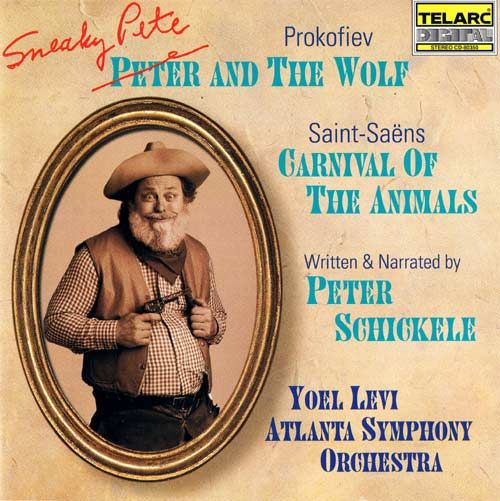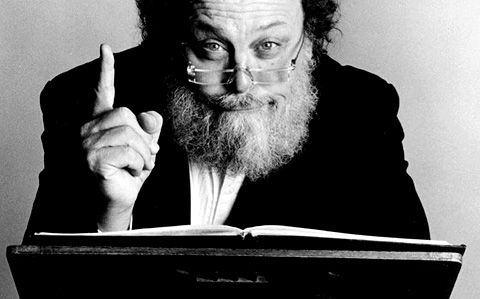wimpel69
12-05-2014, 02:40 PM
FLAC link below. This is my own rip.
Artwork & booklet included. Do not share. Buy the original!
Please leave a "Like" or "Thank you" if you enjoyed this!
Prokofiev's Peter and the Wolf, for narrator and orchestra, was a commission from the Central
Children's Theatre in 1936. The composer himself wrote the text, which tells the story of a young
boy who manages to capture a vicious wolf. The piece is remarkable for many reasons, but perhaps
most notably for its didactic scoring, designed by Prokofiev to introduce children to the sounds of
orchestral instruments. The instrumentation is also important for the narration, since each character
in the story is represented by a different instrument: the bird by a flute, the duck by an oboe, the
grandfather by a bassoon, the cat by a clarinet, the wolf by three horns, and Peter by the strings.
The entire work was composed in a single week (in piano score), and the orchestration was
completed less than two weeks later.
Prokofiev's writing is intentionally direct and transparent, reflecting his desire to make the work
enjoyable for children. His musical characterizations are broad and straightforward, from the
delicate birdsong of the flute, to the thunderous kettledrums portraying the hunters' rifle shots.
The work is in three sections, loosely following a kind of sonata form. The opening section
introduces the main characters, preparing the audience for the action to come. The middle
section--the "development"--contains the most exciting action, beginning with the appearance
of the wolf, his eating of the duck, and his eventual capture by young Peter. The final scene
acts as a recapitulation, as the principal characters return for a final parade; here, Peter's
opening theme returns transformed into a triumphant march.
Like most of Prokofiev's music, Peter and the Wolf features adroit thematic integration
and development. Peter's theme, the dominant theme of the work, is stated at the
beginning of the piece, and is then combined with other subordinate themes. This thematic
blending is also closely tied to the dramatic action, underscoring developments in the
story. Harmonically, the piece begins and ends in C major, but contains many sudden
harmonic shifts, another important aspect of Prokofiev's style. Formally, though the
piece does follow a loose sonata structure, it is by no means a case of textbook form;
themes develop freely, harmonic direction is dictated largely by the action, and
characterization assumes priority over any kind of academic musical construction.
Peter and the Wolf has long been a classic, loved by children for its vivid storytelling,
and by adults for its gentle sense of humor and good-natured tunefulness.
It was composed 22 years after a similar piece, The Ugly Duckling of 1914-1915, which
also features humorous musical sketches of animals. It also bears comparison with
Benjamin Britten's Young Person's Guide to the Orchestra, which also seeks to
acquaint children with the sounds of the symphony.
This new version features a text by contemporary composer/parodist Peter Schickele,
better known as his alter ego "P.D.Q. Bach". Schickele also wrote poems for the new
version of Camille Saint-Sa�ns' Carnival of the Animals.

Music Composed by
Sergei Prokofiev
Camille Saint-Sa�ns
Texts by
Peter Schickele (P.D.Q. Bach)
Played by the
Atlanta Symphony Orchestra
With
Peter Schickele (narrator)
Conducted by
Yoel Levi

"P.D.Q. Bach's completely re-written narrative for "Peter and the Wolf" matches the music very well,
even if it's completely silly. The story is nothing more than a cheezy, sleazy Western cliche, but
Schickele creates a cast of caricatures and innuendos guaranteed to raise some hearty laughter.
I'd still rate it "G" (or "PG13" at worst), by the way.
Carnival des Animaux does not wear Schickele's silliness quite as well, suffering from bad puns
and failed tricks. Still, compared to some narrators I've heard Schickele is mildly distracting
rather than plain awful. More importantly, the orchestra plays with an exuberant joy which
actually makes this one of the better recordings I've heard. It's by no means a subtle performance -
but I believe that that would also miss the point in a piece that's traditionally considered
"Classical music for young children". The same is true for Peter and the Wolf - this recording
can't be beat for simple joy in music! (Although Prokofiev's music is complex enough to
benefit from a more dynamically varied performance.)
Peter Schickele is not only very funny, he has a deep understanding of music
and performance."
Amazon Reviewer

Download Link (updated) - https://mega.nz/#!7QVQFJAa!GKD9CvFWI6eBJuUPCTxacdUandaqos_6Hn1-FTRLFTo
/>
Source: Telarc CD, 1993 (my rip!)
Format: FLAC(RAR), DDD Stereo, Level: -5
File Size: 239 MB (incl. artwork, booklet, log & cue)
Enjoy! Don't share! Buy the original! Please leave a "Like" or "Thank you" if you enjoyed this! :)
Artwork & booklet included. Do not share. Buy the original!
Please leave a "Like" or "Thank you" if you enjoyed this!
Prokofiev's Peter and the Wolf, for narrator and orchestra, was a commission from the Central
Children's Theatre in 1936. The composer himself wrote the text, which tells the story of a young
boy who manages to capture a vicious wolf. The piece is remarkable for many reasons, but perhaps
most notably for its didactic scoring, designed by Prokofiev to introduce children to the sounds of
orchestral instruments. The instrumentation is also important for the narration, since each character
in the story is represented by a different instrument: the bird by a flute, the duck by an oboe, the
grandfather by a bassoon, the cat by a clarinet, the wolf by three horns, and Peter by the strings.
The entire work was composed in a single week (in piano score), and the orchestration was
completed less than two weeks later.
Prokofiev's writing is intentionally direct and transparent, reflecting his desire to make the work
enjoyable for children. His musical characterizations are broad and straightforward, from the
delicate birdsong of the flute, to the thunderous kettledrums portraying the hunters' rifle shots.
The work is in three sections, loosely following a kind of sonata form. The opening section
introduces the main characters, preparing the audience for the action to come. The middle
section--the "development"--contains the most exciting action, beginning with the appearance
of the wolf, his eating of the duck, and his eventual capture by young Peter. The final scene
acts as a recapitulation, as the principal characters return for a final parade; here, Peter's
opening theme returns transformed into a triumphant march.
Like most of Prokofiev's music, Peter and the Wolf features adroit thematic integration
and development. Peter's theme, the dominant theme of the work, is stated at the
beginning of the piece, and is then combined with other subordinate themes. This thematic
blending is also closely tied to the dramatic action, underscoring developments in the
story. Harmonically, the piece begins and ends in C major, but contains many sudden
harmonic shifts, another important aspect of Prokofiev's style. Formally, though the
piece does follow a loose sonata structure, it is by no means a case of textbook form;
themes develop freely, harmonic direction is dictated largely by the action, and
characterization assumes priority over any kind of academic musical construction.
Peter and the Wolf has long been a classic, loved by children for its vivid storytelling,
and by adults for its gentle sense of humor and good-natured tunefulness.
It was composed 22 years after a similar piece, The Ugly Duckling of 1914-1915, which
also features humorous musical sketches of animals. It also bears comparison with
Benjamin Britten's Young Person's Guide to the Orchestra, which also seeks to
acquaint children with the sounds of the symphony.
This new version features a text by contemporary composer/parodist Peter Schickele,
better known as his alter ego "P.D.Q. Bach". Schickele also wrote poems for the new
version of Camille Saint-Sa�ns' Carnival of the Animals.

Music Composed by
Sergei Prokofiev
Camille Saint-Sa�ns
Texts by
Peter Schickele (P.D.Q. Bach)
Played by the
Atlanta Symphony Orchestra
With
Peter Schickele (narrator)
Conducted by
Yoel Levi

"P.D.Q. Bach's completely re-written narrative for "Peter and the Wolf" matches the music very well,
even if it's completely silly. The story is nothing more than a cheezy, sleazy Western cliche, but
Schickele creates a cast of caricatures and innuendos guaranteed to raise some hearty laughter.
I'd still rate it "G" (or "PG13" at worst), by the way.
Carnival des Animaux does not wear Schickele's silliness quite as well, suffering from bad puns
and failed tricks. Still, compared to some narrators I've heard Schickele is mildly distracting
rather than plain awful. More importantly, the orchestra plays with an exuberant joy which
actually makes this one of the better recordings I've heard. It's by no means a subtle performance -
but I believe that that would also miss the point in a piece that's traditionally considered
"Classical music for young children". The same is true for Peter and the Wolf - this recording
can't be beat for simple joy in music! (Although Prokofiev's music is complex enough to
benefit from a more dynamically varied performance.)
Peter Schickele is not only very funny, he has a deep understanding of music
and performance."
Amazon Reviewer

Download Link (updated) - https://mega.nz/#!7QVQFJAa!GKD9CvFWI6eBJuUPCTxacdUandaqos_6Hn1-FTRLFTo
/>
Source: Telarc CD, 1993 (my rip!)
Format: FLAC(RAR), DDD Stereo, Level: -5
File Size: 239 MB (incl. artwork, booklet, log & cue)
Enjoy! Don't share! Buy the original! Please leave a "Like" or "Thank you" if you enjoyed this! :)